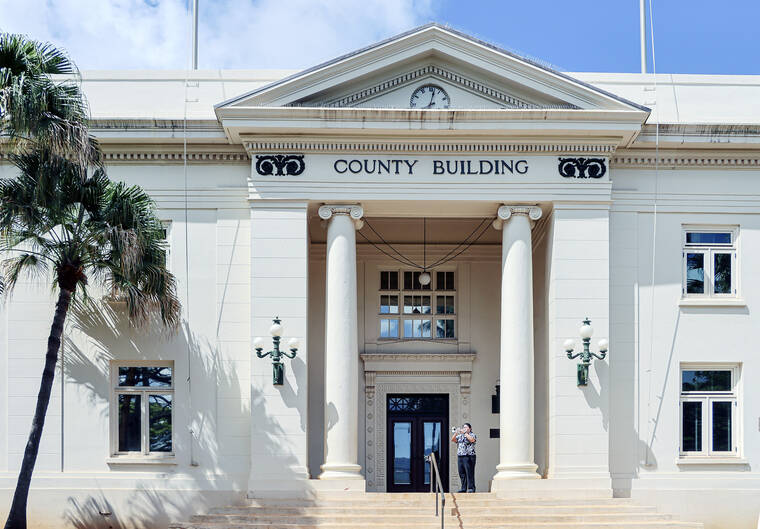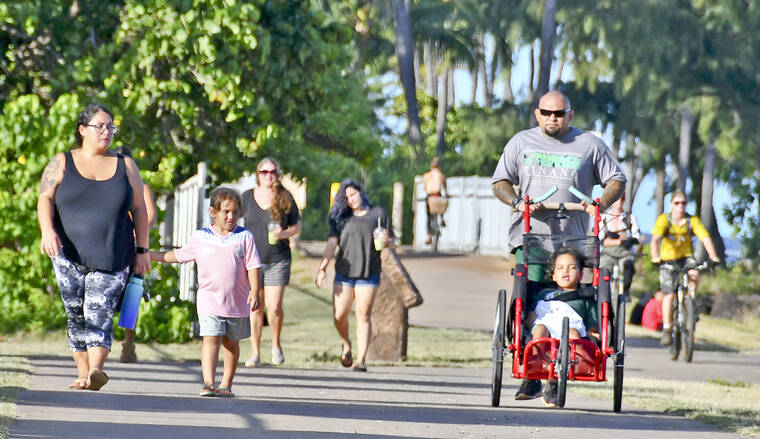LIHU‘E — After a months-long process, the County Council gave final approval Wednesday to the fiscal year 2022-23 county operating budget of $260.3 million and capital improvement projects budget of $50.9 million.
It was a total increase of more than $40 million over the current budget (a $243.3 million operating budget and $24.8 million CIP tab), with the majority of the additional funds going towards CIP projects.
This increase was possible because of a 25% bump in revenues over last year — a result of the reclassification of the residential investor tax class, increasing property values and a new, island-based transient accommodations tax.
The council touted the budget as fiscally responsible, with the increase in revenues going towards one-time costs rather than long-term increases.
“The admin and the council were extremely cognizant of not growing government,” said Council Chair Arryl Kaneshiro, in his final year leading the budget process before he is termed out. “We all should pat ourselves on the back for not going crazy with that increase.”
Mayor Derek Kawakami submitted the initial budget in March, and after weeks of presentations with individual departments in front of the council, a supplemental budget in May.
“We thank and appreciate the Kaua‘i County Council’s productive and transparent dialogue during this year’s budget review,” said Kawakami. “It is through strong partnerships and efficient planning that together we could put forth a structurally balanced budget that prioritizes the public’s important needs while ensuring a solid foundation is set for future years.”
In his supplemental budget communication, the mayor laid out a strategy for the budgeting process: “to utilize increased revenues to tackle capital-improvement needs, particularly in areas related to deferred maintenance.”
Among these CIP needs are about $3.4 million for overdue system upgrades to the Lihu‘e and Wailua Wastewater Treatment Plants, about $1.5 million for network infrastructure and video conferencing including in the Historic County Building, and $3 million for public safety and communications systems.
In response to the ongoing Kekaha landfill situation — the initial site for a new landfill fell through, leaving the county struggling to figure out a solution before the Kekaha site fills up — the budget allocated funds for studies of curbside recycling, a materials recovery facility and further landfill-siting efforts.
Following a positive response to the Lydgate Park Inclusive Playground, the mayor allocated $225,000 towards another inclusive playground for the Westside of Kaua‘i in his supplemental budget.
The final budget features no worker layoffs or furloughs, and adheres to union collective-bargaining agreements.
“Our best success with this budget is to fully fund our employees,” said Councilmember KipuKai Kuali‘i. “Yes, it’s a structurally balanced budget, but what’s critically important to me is — no furloughs, no layoffs, and honoring our negotiated collective-bargaining agreements.”
Several additional positions were added, including three for a maintenance crew responsible for the beautification in and around the Lihu‘e Town Core area and a new parks security officer responsible for the Ke Ala Hele Makalae Eastside coastal path and nearby Bryan J. Baptiste Sports Complex in Kapa‘a.
Most departments saw a modest increase in funding, and the council largely accepted the budget as presented by the mayor.
“When the budget comes to us as a submittal, there’s not a lot of fat to (it),” said Kaneshiro. “That’s why you don’t see us being able to cut a whole bunch of stuff.”
The Kaua‘i Police Department saw its budget increase 3.7% to $41,701,612, driven largely by increases in benefits.
The Kaua‘i Fire Department budget increased 3.2%, driven by similar salary and benefits costs.
The County Housing Agency, which is funded largely by non-county sources like federal programs and grants, was allocated $3 million to its revolving fund for affordable-housing initiatives.
This allocation was almost more than doubled with a proposal from Councilmember Luke Evslin at a May 13 Committee of the Whole, which would have raised the taxes on vacation-rental units and used the $4.4 million generated to fund affordable housing.
Yet concerns over the lack of public input on the proposal, the fact that revenues would not be guaranteed to go towards affordable housing in future years, and the general sense that the tax was unnecessary in a year when revenues were already up, led to the measure being voted down, 4-3.
The budgets can be viewed at kauai.gov/Government/County-Council/Budget-Notices-Minutes-Ordinances.
•••
Guthrie Scrimgeour, reporter, can be reached at 647-0329 or gscrimgeour@thegardenisland.com.





